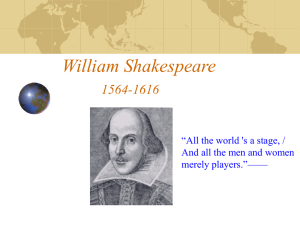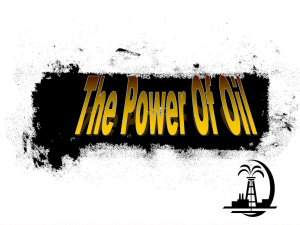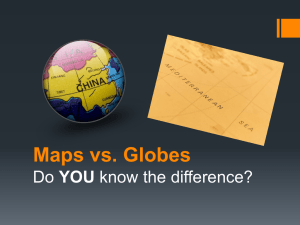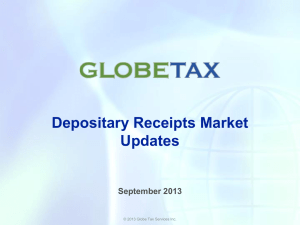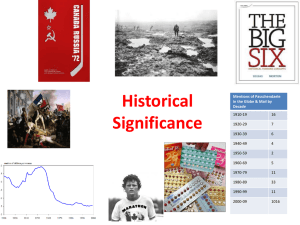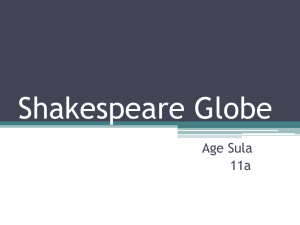Outreach You Can Do to Promote Dark Skies
advertisement
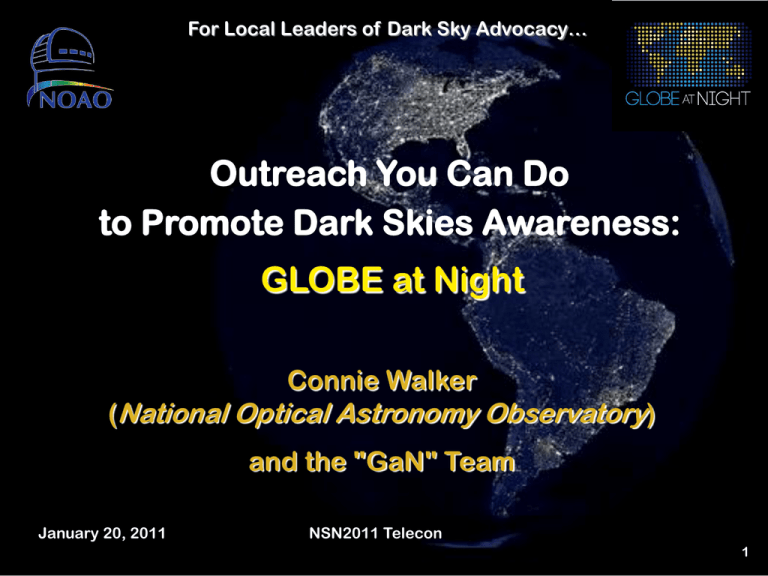
For Local Leaders of Dark Sky Advocacy… Outreach You Can Do to Promote Dark Skies Awareness: GLOBE at Night Connie Walker (National Optical Astronomy Observatory) and the "GaN" Team January 20, 2011 NSN2011 Telecon 1 1 National Optical Astronomy Observatory Cerro Tololo InterAmerican Observatory Kitt Peak National Observatory 2 A global problem that people can help solve locally… 3 How to bring awareness and a desire to slow down the increase in light pollution? (Cinzano, Falchi, and Elvidge 2001) 4 Questions to Consider How do you explain to city dwellers the importance of what they’ve lost to artificial sky glow? How can you make them aware that light pollution is a concern on many fronts: safety, energy conservation, cost, health and effects on wildlife, as well as our ability to view the stars? How do you convince them that it’s worthwhile to take steps, even small ones, to help redress this issue? 5 Light Pollution Education at NOAO Students in Grades K-12, Teachers, General Public Both formal and informal settings GLOBE at Night Campaign Dark Skies Rangers activities 6 GLOBE at Night www.globeatnight.org • Citizen-scientists record the brightness of the night sky by matching its appearance toward the constellation Orion with star maps of progressively fainter stars. • Measurements are submitted on-line and resulting maps of all worldwide observations are created. • Over the last 5 annual two-week GLOBE at Night campaigns, 52,000 measurements have been contributed from over 100 countries. 7 GLOBE at Night Website www.globeatnight.org 5 step citizen science program – simple to participate Background information on key concepts Interactive games Fun quizzes to check proficiency Teacher and Family Guides in 14 different languages Postcards, flyers en español también! Report page Map page with data in various formats 8 Match Night Sky to a Magnitude Chart. Estimate cloud coverage. Fill out the observation sheet. 9 A more technically accurate approach: using Sky Quality Meters Press start button here: Light enters here: Read-out numbers here: 10 Simple Report Form http://www.globeatnight.org/report.html Date and Time Tablet/Pad Cell Phone Location Orion data Desktop/ Laptop Cloudiness and SQM data 11 Measurements are downloadable as datasets in various formats can be examined online via Google Earth or other tools used as the basis of research in a classroom or science fair project or even to inform the development of public policy 12 Dark Skies Ranger Activities www.darkskiesawareness.org/DarkSkiesRangers/ • Explorer - Light Shielding Demo - School Outdoor Lighting Audit - Student Symposium • Protector Turtle Hatching Activity Wildlife Activity (Insects) • Advocate Magnitude Reader Finding Orion, Leo, etc. A Star Hunt Campaign. Ranger (Students present results.) 13 14 14 Dark Skies Education Kits (600 kits distributed) • Materials for a light shielding demonstration • Dark Skies Ranger activities • Dark Skies Education & GLOBE at Night resources on CD and 2 DVDs • Advertising materials (postcards, poster, flyers, etc) • Children’s Book: “There Once was a Sky Full of Stars” • Quiet Skies Activity (AM radio & fan) • Sky Quality Meter (optional) 15 Shielding Helps Minimize Light Pollution 16 Types of Lamps • Incandescent • Fluorescent • Light Emitting Diode (LED) • High Intensity Discharge Fluorescent Compact Fluorescent Lamp LED Incandescent High Intensity Discharge 17 Unshielded and Shielded Lighting 18 The Difference Retrofitting Luminaires Can Make 19 Lighting Responsibly • Shine the light down. • See the effect, not the source. • Light only where and when needed. • Don’t over light. • Use energy efficient sources. 20 3 Main Types of Light Pollution Light Trespass Glare Sky Glow 21 The Effects on… Astronomical Research Human Health Energy, Safety & Security Wildlife 22 Data Analysis • Comparison of data over time (changes, trends) • Comparison to data on population density • Search for dark sky oases • Monitor ordinance compliance • Effects of light pollution on animals or plants • Effects on human health • Effects on safety, security, energy consumption, cost Tucson, Arizona, USA 23 5 km North Students Ask: How Much of the Night Sky Have We Already Lost? 24 City Lighting Inventory by High Schoolers & Amateur Astronomers N 1 km 25 GLOBE at Night Data 2006-2010 2500 Orion data points plus 500 SQM data points for Tucson, AZ 26 Contour Map of GaN Data (2006-2010) 27 GLOBE at Night + Bat Telemetry Data 28 Bat Telemetry Data + City Ordinance Zones 29 Looking Toward the Future by Building... • An on-line community with Facebook and Twitter – done! • On-line tutorials of the Dark Skies Rangers activities – half way done! • A web application to submit GLOBE at Night data using mobile devices – help us test the app! • More monthly campaigns – on their way! • A user-friendly analysis tool on the GLOBE at Night website (WWT & WGBH) – a bright future! 30 GLOBE at Night Needs You... Mag 1 To take GLOBE at Night data during both campaigns. 2 To teach and encourage children and adults to take GLOBE at Night measurements. 3 To become a local coordinator that would work with people at a starparty, or in a classroom or 2 or 3... or with visitors at a local park on their participation in the GLOBE at Night campaign. 4 To do the Dark Skies Rangers activities with students to teach them about light pollution issues and lighting responsibly. 5 To use the GLOBE at Night data with other data sets. 6 To work with the IDA in preserving dark skies. 7 To do it all. 31 GLOBE at Night Campaign 2011 February 21 to March 6 for both Northern and Southern Hemispheres March 22 to April 4 for Northern Hemisphere Uses Orion. Uses Leo. March 24 to April 6 for Southern Hemisphere Uses Leo or Crux. 32 Further Information Websites of interest: www.darkskiesawareness.org/DarkSkiesRan gers/ www.globeatnight.org www.facebook.com/GLOBEatNight twitter.com/GLOBEatNight www.globeatnight.org/webapp Contact: Connie Walker GLOBE at Night Director 1-520-318-8535 or cwalker@noao.edu iPhone, Android or Blackberry? Scan the QR Code above to go directly to the beta version of the GLOBE at Night data submission web app. 33 Sponsoring Institutions GLOBE at Night (www.globeatnight.org) has been a collaboration between the National Optical Astronomy Observatory (NOAO) in Tucson, AZ; The Global Learning and Observations to Benefit the Environment (GLOBE) Program, in Boulder, CO; the Environmental Systems Research Institute, Inc. (ESRI) in Redlands, CA; the International Dark-Sky Association (IDA) in Tucson, AZ; and the Centro de Apoyo a la Didactica de la Astronomia (CADIAS) in Altovalsol, Chile. Other partners include the Astronomical Society of the Pacific, the American Astronomical Society, the Astronomical League, Astronomers Without Borders, The World At Night, and Let There Be Night,org. 34
